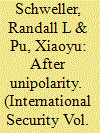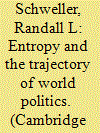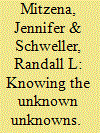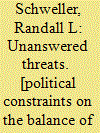|
|
|
Sort Order |
|
|
|
Items / Page
|
|
|
|
|
|
|
| Srl | Item |
| 1 |
ID:
105977


|
|
|
|
|
| Publication |
2011.
|
| Summary/Abstract |
The emerging transition from unipolarity to a more multipolar distribution of global power presents a unique and unappreciated problem that largely explains why, contrary to the expectations of balance of power theory, a counterbalancing reaction to U.S. primacy has not yet taken place. The problem is that, under unipolarity and only unipolarity, balancing is a revisionist, not a status quo, behavior: its purpose is to replace the existing unbalanced unipolar structure with a balance of power system. Thus, any state that seeks to restore a global balance of power will be labeled a revisionist aggressor. To overcome this ideational hurdle to balancing behavior, a rising power must delegitimize the unipole's global authority and order through discursive and cost-imposing practices of resistance that pave the way for the next phase of full-fledged balancing and global contestation. The type of international order that emerges on the other side of the transition out of unipolarity depends on whether the emerging powers assume the role of supporters, spoilers, or shirkers. As the most viable peer competitor to U.S. power, China will play an especially important role in determining the future shape of international politics. At this relatively early stage in its development, however, China does not yet have a fixed blueprint for a new world order. Instead, competing Chinese visions of order map on to various delegitimation strategies and scenarios about how the transition from unipolarity to a restored global balance of power will develop.
|
|
|
|
|
|
|
|
|
|
|
|
|
|
|
|
| 2 |
ID:
094560


|
|
|
|
|
| Publication |
2010.
|
| Summary/Abstract |
The random and indeterminate nature of the current unipolar world suggests a condition of increasing entropy. There are two reasons for this claim. First, relative capability advantages under unipolarity do not translate as easily as they once did into power and influence over others. Second, systemic constraint is a property that limits actors' freedom of action by imposing costs and benefits on certain kinds of actions. Unlike past multipolar and bipolar systems, the current unipolar system exerts only weak, if any, systemic constraints on the unipolar power and all other actors as well. Thus, polarity has become a largely meaningless concept. Today, system process rather than structure best explains international politics, and this process is one of entropy. Finally, I suggest two pathways from unipolarity to a more balanced system: one is fairly consistent with standard balance-of-power realism but adds an ideational component; the other restores equilibrium by means of entropy.
|
|
|
|
|
|
|
|
|
|
|
|
|
|
|
|
| 3 |
ID:
093377


|
|
|
| 4 |
ID:
106957


|
|
|
|
|
| Publication |
2011.
|
| Summary/Abstract |
The standard view of contemporary unipolar politics is that systemic constraints impede the translation of American power capabilities into influence over security outcomes, rendering the United States (US) much less capable than its material capabilities imply. Challenging this logic, William Wohlforth and Stephen Brooks argue that systemic constraints under unipolarity are largely inoperative with respect to the security policies of the unipolar power. Indeed, the US is uniquely positioned in today's world to convert its enormous capability advantages into influence and usable power. While World out of balance is a masterwork of logical and rigorous argumentation, Brooks and Wohlforth, in their exclusive focus on the hegemon and its policies, do not attempt to offer a general theory of unipolarity. Thus, they do not consider the possibility that unipolarity does not constrain any actors or the issue of system change. This essay advances two routes out of unipolarity: (1) a 'delegitimation' phase followed by regular balancing behavior and (2) a sudden and dramatic shift from unipolarity to multipolarity brought on by an unforeseen US collapse.
|
|
|
|
|
|
|
|
|
|
|
|
|
|
|
|
| 5 |
ID:
104074


|
|
|
|
|
| Publication |
2011.
|
| Summary/Abstract |
International Relations (IR) theory grants a privileged place to uncertainty. In practice, however, the problem does not seem to be uncertainty but certainty: if only the decision makers would acknowledge uncertainty, conflict might somehow be avoided. We challenge the "uncertainty bias" of IR scholarship by developing misplaced certainty as a distinct and common pathway to war. By misplaced certainty we mean cases where decision makers are confident that they know each other's capabilities, intentions, or both; but their confidence is unwarranted yet persists even in the face of disconfirming evidence. We argue that misplaced certainty drives two familiar conflict pathways thought to depend on uncertainty: security dilemmas and spirals. We then conceptualize misplaced certainty, highlighting its affective dimension. Building on the work of post-Keynesian economists and economic sociologists we articulate the dynamics of certainty production and how it can go awry. Our "confidence model" of certainty can account for both the phenomenology and frequency of misplaced certainty, particularly in conflict situations, while providing social theoretical underpinnings to the Classical Realist admonition of prudence.
|
|
|
|
|
|
|
|
|
|
|
|
|
|
|
|
| 6 |
ID:
107171


|
|
|
| 7 |
ID:
077610


|
|
|
|
|
| Publication |
Princeton, Princeton University Press, 2006.
|
| Description |
xi, 182p.
|
| Series |
Princeton studies in international history and politics
|
| Standard Number |
9780691124254
|
|
|
|
|
|
|
|
|
|
|
|
Copies: C:1/I:0,R:0,Q:0
Circulation
| Accession# | Call# | Current Location | Status | Policy | Location |
| 052370 | 327.112/SCH 052370 | Main | On Shelf | General | |
|
|
|
|
| 8 |
ID:
057988


|
|
|
|
|
|
|
|